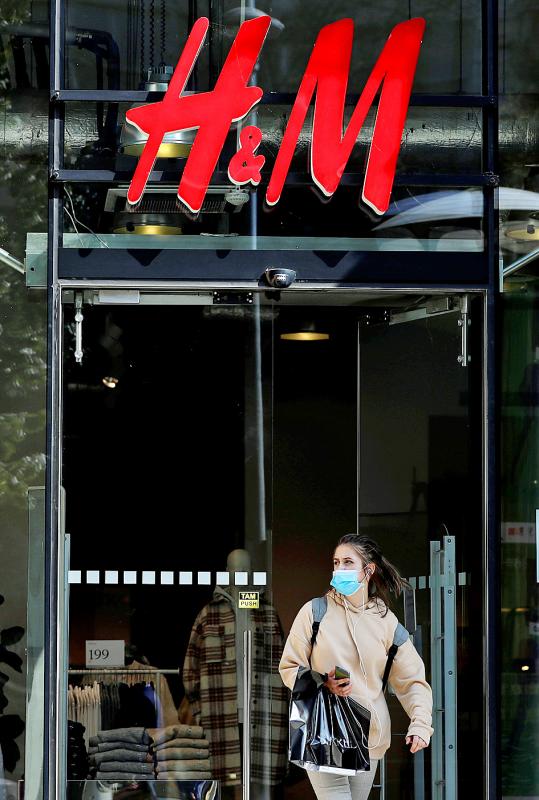Swedish clothing giant Hennes & Mauritz AB (H&M) on Tuesday said that it was ending its relationship with a Chinese yarn producer over accusations of “forced labor” involving ethnic and religious minorities from China’s Xinjiang region.
The fashion retailer specified that it did not work with any garment factories in the region and that it would no longer source cotton from Xinjiang, which is China’s largest cotton-growing area.
A report by the Australian Strategic Policy Institute think tank, published in March, pointed to H&M as one of the beneficiaries of a forced labor transfer program through their relationship with the dyed yarn producer Huafu Fashion Co’s (華孚時尚) factory in Anhui Province.

Photo: Reuters
However, H&M said in a statement that it had never had a relationship with the factory in Anhui, nor Huafu’s operations in Xinjiang.
H&M did concede that it has an “indirect business relationship with one mill” in Shangyu in Zhejiang Province, belonging to Huafu.
“While there are no indications for forced labor in the Shangyu mill, we have decided to, until we get more clarity around allegations of forced labor, phase out our indirect business relationship with Huafu Fashion Co, regardless of unit and province, within the next 12 months,” H&M said.
The company also said that it had conducted “an inquiry at all the garment manufacturing factories we work with in China aiming to ensure that they are not employing workers ... through what is reported on as labor transfer programs or employment schemes where forced labor is an increased risk.”
International pressure is building on the Chinese Communist Party over its actions in the resource-rich Xinjiang region, and the EU on Monday pressed China to let its independent observers into Xinjiang, binding human rights to future trade and investment deals with Beijing.
Rights groups say that more than 1 million Uighurs languish in political re-education camps, which Beijing describes as vocational training centers where education is given to lift the population out of poverty and to chisel away at Islamic radicalism.
China says that criticism of its handling of Xinjiang is politically motivated, and based on lies about what happens in the vast facilities it has built.
US Customs and Border Protection on Monday said it would bar a raft of Chinese products from Xinjiang over fears that they were made using forced labor.
China on Tuesday slammed the US move as “bullying” and dismissed accusations of forced labor as “a complete fabrication.”

POWERING UP: PSUs for AI servers made up about 50% of Delta’s total server PSU revenue during the first three quarters of last year, the company said Power supply and electronic components maker Delta Electronics Inc (台達電) reported record-high revenue of NT$161.61 billion (US$5.11 billion) for last quarter and said it remains positive about this quarter. Last quarter’s figure was up 7.6 percent from the previous quarter and 41.51 percent higher than a year earlier, and largely in line with Yuanta Securities Investment Consulting Co’s (元大投顧) forecast of NT$160 billion. Delta’s annual revenue last year rose 31.76 percent year-on-year to NT$554.89 billion, also a record high for the company. Its strong performance reflected continued demand for high-performance power solutions and advanced liquid-cooling products used in artificial intelligence (AI) data centers,

SIZE MATTERS: TSMC started phasing out 8-inch wafer production last year, while Samsung is more aggressively retiring 8-inch capacity, TrendForce said Chipmakers are expected to raise prices of 8-inch wafers by up to 20 percent this year on concern over supply constraints as major contract chipmakers Taiwan Semiconductor Manufacturing Co (TSMC, 台積電) and Samsung Electronics Co gradually retire less advanced wafer capacity, TrendForce Corp (集邦科技) said yesterday. It is the first significant across-the-board price hike since a global semiconductor correction in 2023, the Taipei-based market researcher said in a report. Global 8-inch wafer capacity slid 0.3 percent year-on-year last year, although 8-inch wafer prices still hovered at relatively stable levels throughout the year, TrendForce said. The downward trend is expected to continue this year,

Vincent Wei led fellow Singaporean farmers around an empty Malaysian plot, laying out plans for a greenhouse and rows of leafy vegetables. What he pitched was not just space for crops, but a lifeline for growers struggling to make ends meet in a city-state with high prices and little vacant land. The future agriculture hub is part of a joint special economic zone launched last year by the two neighbors, expected to cost US$123 million and produce 10,000 tonnes of fresh produce annually. It is attracting Singaporean farmers with promises of cheaper land, labor and energy just over the border.

A proposed billionaires’ tax in California has ignited a political uproar in Silicon Valley, with tech titans threatening to leave the state while California Governor Gavin Newsom of the Democratic Party maneuvers to defeat a levy that he fears would lead to an exodus of wealth. A technology mecca, California has more billionaires than any other US state — a few hundred, by some estimates. About half its personal income tax revenue, a financial backbone in the nearly US$350 billion budget, comes from the top 1 percent of earners. A large healthcare union is attempting to place a proposal before